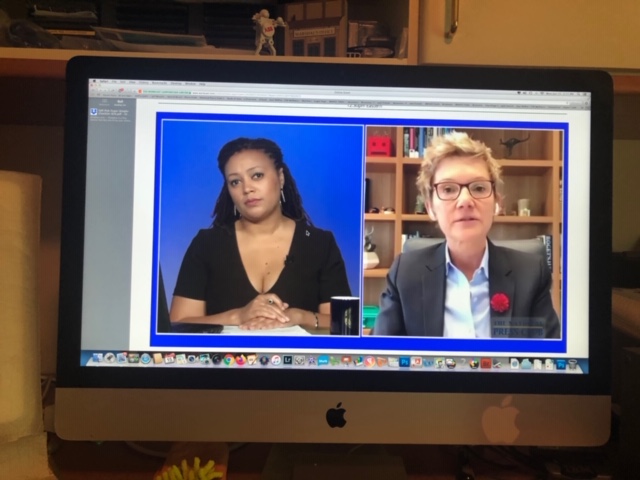Federal Reserve bank president advocates health, education, digital investments to boost post-COVID economy
Mary C. Daly, president of the Federal Reserve Bank of San Francisco, advocated public investment in health, education and digital infrastructure, as well as emergency policies aimed at expanding employment, to boost an equitable economic recovery from COVID-19.
"Three crises – health, economic and social – have converged to create one difficult moment in American history,” she said. The crises have hit disadvantaged groups - the disabled, people of color and those with the least education - disproportionately, she said during an online National Press Club Newsmaker Monday, June 15.

Daly cited the Federal Reserve’s emergency policy of cutting interest rates to “essentially zero” and lending to assist financial markets. In addition, The Treasury provided direct lending both to business, and state and local governments, she said.
These actions reflect lessons learned from the Great Depression of the 1930s and the more recent Great Recession of a decade ago, she reminded the audience. The 1930s taught the lesson that a forceful monetary policy by the Federal Reserve is needed in a crisis and the experience of the Great Recession meant that policymakers were prepared to take action, she said.
Congress and the White House approved several rounds of broad-based economic relief worth $3 trillion, providing support to households and small businesses, plus enhancing and expanding unemployment payments, she said.
Because no one knows if these steps are sufficient, flexibility is required together with a commitment to action to do whatever it takes over the long term, she said.
Daly advocated three areas of public investment: health, education and digital infrastructure.
Existing inequities in access and outcomes of health care leave the less advantaged less able to weather economic shocks, Daly said. “A healthy economy requires healthy people,” she said.
Daly called for full life-cycle education as the best insurance against job losses, beginning with early-childhood education, which has the further benefit of allowing parents to work. She advocated expanded enrollment and completion in higher education. Lifelong learning also is needed for skills training after workers are displaced by economic shocks, she said.
Gaps in digital access were made apparent by the COVID-19 crisis and need to be addressed because jobs and education will become more dependent on online access, Daly said.
Moderator Kimberly Adams, a reporter for Marketplace and a Club Board of Governors member, asked for Daly’s reaction to the Supreme Court decision banning employment discrimination of LGBT individuals, which was announced earlier that day. Removing any barrier to employment frees potential for the benefit of the economy, Daly responded.
Adams asked about the effect of the current situation on retirees. Daly advocated a long-term perspective on investments, not reacting to ups and downs in the markets.
“Stay steady in the boat,” Daly said.
For younger people, Daly advised resiliency and short goals.
Adams alluded to Daly’s having being from a disadvantaged family. Daly mentioned not graduating from high school, but acquiring a mentor who encouraged her to get a GED diploma, and then go on to college and graduate school. Focus on each step, then the next, she said.
Asked how she would fund her public-investment proposals, Daly said they were “big buckets,” but specific proposals would have to come from fiscal agents, which are Congress and state legislatures.
